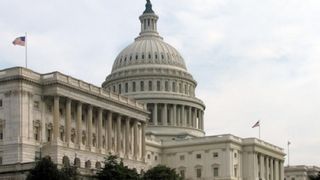House Joins Senate in Trying to Free Up More Spectrum

House Communications Subcommittee ranking member Mike Doyle (D-Pa.) and vice chair Leonard Lance (R-N.J.) have introduced a bipartisan bill to goose the federal government to free up more licensed and unlicensed spectrum for advanced wireless.
That is already an avowed goal of the FCC under chairman Ajit Pai--the FCC is looking to free higher-band spectrum for 5G, for example--but the legislators aren't taking any chances.
The Advancing Innovation and Reinvigorating Widespread Access to Viable Electromagnetic Spectrum (AIRWAVES) Act mirrors legislation in the Senate--backed by Sens. Cory Gardner (R-Colo.) and Maggie Hassan (D-N.H) that requires the FCC to hold auctions in each of the next three years that grants spectrum licenses in various bands, and National Telecommunications and Information Administration to identify the frequencies for either commercial license use or non-federal unlicensed use, and directs the FCC to allocated 10% of the auction proceeds to fund wireless infrastructure in unserved or underserved rural areas.
The FCC will also have to conduct a study of how unlicensed spectrum can be used for rural healthcare, distance learning and agriculture.
The two bills are not identical, says Doyle Legislative Director Philip Murphy. The House draft includes "more explicit protections for General Authorized Access (GAA) in the Citizens Broadband Radio Service band; enhanced flexibility for the FCC in the making spectrum available for mobile broadband in the 3700 - 4200 MHz band; retains the current band plan for 37 GHz – 37.6 GHz, which allows for site-specific coordinated shared access for commercial users; and adds 24 and 47 GHz blocks to an aggressive schedule of spectrum auctions in the microwave bands aimed at promoting robust and competitive 5G deployments."
"To compete in the 21st century we must have a robust spectrum pipeline so we can win the race to 5G as we did with 4G LTE," said Rep. Lance. "We also have to close the connectivity divide and bring reliable Internet service to a larger segment of Americans – especially those in unserved areas. And with multi-device households on the rise we need more data to stay connected. All consumers need a system with faster speed, better reliability and affordable options and the AIRWAVES Act brings us one step closer,”
President Donald Trump has said rural broadband deployment as a way to connect farmers is a priority, a point he made in a recent speech to a farm group last month.
Related: White House: Secure 5G National Priority
FCC chairman Ajit Pai has said that Congress needs to fix.
Not surprisingly, wireless carriers who stand to get access to that spectrum were pleased.
"Making additional spectrum available for commercial use will benefit the economy, industry, and most importantly consumers, and will help achieve the FCC’s important goal of closing the digital divide," said Competitive Carriers Association President Steven K. Berry. "Particularly as AT&T and Verizon have dominated secondary market transactions for millimeter wave [high-band] spectrum, a swift auction of these bands will give all carriers a meaningful opportunity to access critical spectrum resources.”
“I am especially pleased that the AIRWAVES Act includes the 24 and 47 GHz bands in the competitive bidding process and also a rural buildout funding mechanism to ensure rural areas are not left behind," he added. "I applaud the members for understanding that many rural locations do not have mobile broadband services comparable to their urban counterparts and look forward to continued work to move this legislation forward.”
CTIA, the wireless association, also supports the bill.
“CTIA applauds Representatives Lance and Doyle for their bipartisan leadership in introducing the AIRWAVES Act in the House," said CTIA SVP Kelly Cole. "This legislation provides a vital long-term plan to free up valuable licensed spectrum as demand for wireless data and content continues to surge. An open spectrum pipeline is critical to meet consumers’ need for new and innovative services and maintain America’s lead in the global race to 5G."
Public Knowledge, a big backer of unlicensed spectrum, joined the crowd of fans.
“This is exactly the sort of sensible, bipartisan approach we need to bring broadband to rural America," said Public Knowledge SVP Harold Feld. "No fancy tricks or hidden agendas; just a straightforward plan to give providers the wireless capacity they need to serve their communities, combined with targeted funding for building towers and other infrastructure -- and all without appropriating a single new federal dollar."
Original co-sponsors of the bill are Reps. Brett Guthrie (R-Ky.), Doris Matsui (D-Calif.), Susan Brooks (R-Ind.), Peter Welch (D-Vt.), Tim Walberg (R-Mich.) and Yvette Clarke (D-N.Y.).
Broadcasting & Cable Newsletter
The smarter way to stay on top of broadcasting and cable industry. Sign up below
Contributing editor John Eggerton has been an editor and/or writer on media regulation, legislation and policy for over four decades, including covering the FCC, FTC, Congress, the major media trade associations, and the federal courts. In addition to Multichannel News and Broadcasting + Cable, his work has appeared in Radio World, TV Technology, TV Fax, This Week in Consumer Electronics, Variety and the Encyclopedia Britannica.

